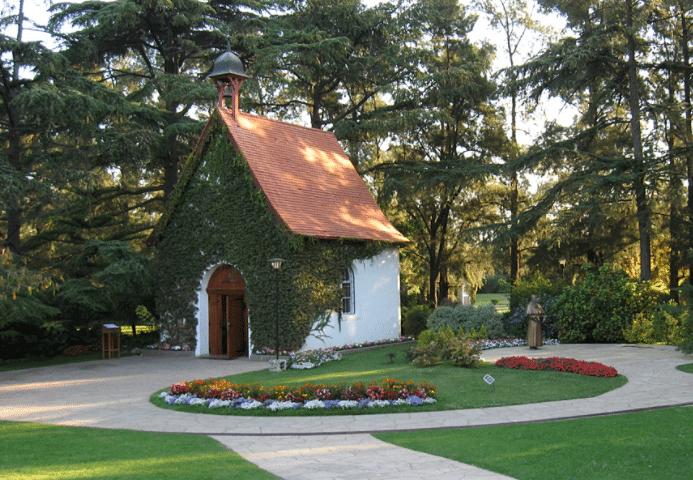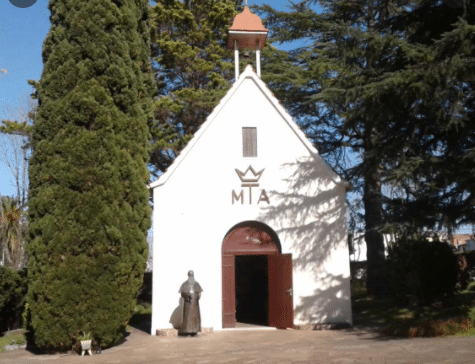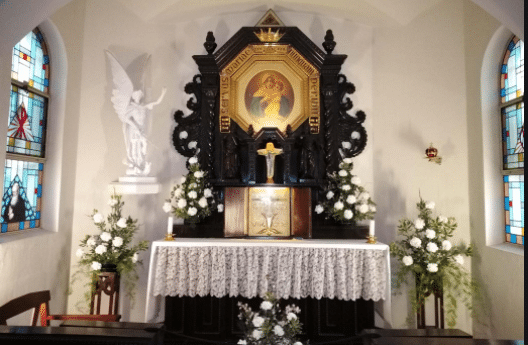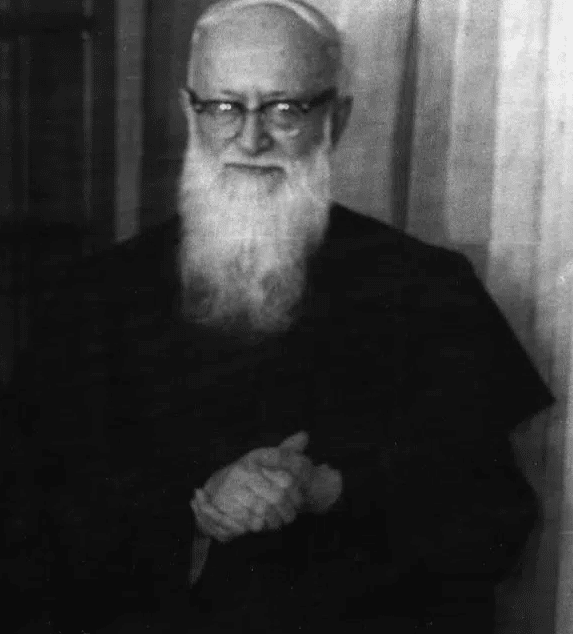Panorama
The Schoenstatt Sisters in Argentina, as in all their branches in other continents, had experienced Father Kentenich’s self-offering in the concentration camp of Dachau as a very profound seal of God’s action in Schoenstatt. In this way, a very profound solidarity of destinies developed between Father Kentenich and them. He had renounced to accept any human means that could have prevented his going to the concentration camp so that his spiritual children could conquer the freedom of the children of God.
This way, the words were engraved on the foundation stone of the first Schoenstatt Shrine in Argentina: “This Shrine must be a guarantee and pledge for all times that the spirit of January 20, 1942 will not die in the Family”. Who would have suspected that on that same day the Sisters in Schoenstatt, Germany, would learn of the separation of the Founder from his work by the Holy Office?

Jubilee of the National Schoenstatt Shrine in Argentina
The Father Shrine, blessed by Father Joseph Kentenich on January 20, 1952, is about to celebrate its 70th anniversary. New Schoenstatt, located in Florencio Varela, Buenos Aires, will be the site of the celebrations.
Father’s Shrine, where did you get your name?
It was not the first to be built in the image of the Original Shrine. It was not the second, nor the third… It needed a long time to be longed for, sought, consecrated by Father Kentenich and blessed with his tears.
Second milestone
On January 20, 1942 – a turning point in Schoenstatt’s history – something that had been brewing became real, like everything that is alive: the bond with the Founding Father. This bond was deepened by his decision not to accept or take any human means to escape the concentration camp, and this was vividly captured in a spontaneous way in the souls of the missionary sisters who received Father Kentenich’s visit after his liberation from Dachau.
Providentially, upon their arrival in New Helvetia, Uruguay, temporary headquarters of the Sisters of Argentina-Uruguay, the community of the Sisters of Mary had contact for the first time with the written material and the clandestine texts that had been exchanged during the time of Father Kentenich’s imprisonment in Koblenz. The founder himself recounted the events of those months, which culminated in the decision taken on January 20th. Furthermore, the Sisters had the vital experience of his various visits between the years 1947 – 1952.
Current of Daughter Shrines

In 1943, while Father Kentenich was still in Dachau, the first Daughter Shrine was erected in New Helvetia, Uruguay. On his first visit to South America, the founder expressed his joy for this initiative and suggested it to the other countries of South America. In Santa Maria, Brazil, a Daughter Shrine was built in 1948; another in 1949 in Santiago, Chile and in Cathcart, South Africa.

Why didn’t the same thing happen in Argentina?
Divine Providence foresaw that it would not be as easy to find how to demonstrate even further, the community of destinies between the Family and the Founder. In May 1948, when he left for the United States, Father Kentenich expressly left the task of finding a place for the Shrine. Three years and eight months had to pass, the same amount of time he had been deprived of his freedom while in jail and the concentration camp, to be able to find the right place and purchase the land. During those difficult years, as we will see in the second and third part of the story, the struggles to conquer the land were intertwined with those waged by the Founder, trying to make the Schoenstatt charism understood as God’s offering to the Church and the world.
He himself had purchased a ticket to come and bless the Shrine on January 20, 1951, but nothing came out of that. It was not until August 15 of that year that the Sisters were able to lay the foundation stone on the land of New Schoenstatt, where the Mater ter Admirabilis finally wanted to establish herself for the first time in Argentina.
The founder had promised that he would come to bless this Shrine from any place in the world where he was. Would it be possible to fulfill this promise being now chained by decrees and prohibitions? Uncertainty clouded the joy of what at last seemed to be coming true.
The Shrine was being built with the contributions of the new Schoenstatt Family that was slowly growing. January 20, 1952 would now be the ideal date for the blessing of this Shrine. But… Could Father Kentenich be present?
January 11, 1952. A telegram: “Will arrive Thursday at 8:00 a.m. on SAS 923”.

Father Kentenich informs that he will arrive in Argentina. The immense joy of these news is undone again when he is notified that, due to the strict administrative measures that had been taken with him, the Sisters were forbidden, under grave sin, to speak to him.
Thursday, January 17, 1952. Father Joseph Kentenich arrives at Ezeiza International Airport. “It is a miracle, a miracle of trust that I am here”, he expresses when he steps on Argentinean soil.
January 20, 1952, ten years after the second milestone in Schoenstatt history.
The flowers that adorn the altarpiece and the altar for the feast of the blessing of the newly built little chapel, form the letter “v”, a symbol of victory. Upon arrival Father kneels at the communion rail and with his finger traces a “v” indicating that he understands the message. The sisters are kneeling in the pews. From the back of the Shrine, Sister M. Ursula, Provincial Superior, with tears in her eyes, spontaneously prays: “Most Holy Virgin, how can you allow this? For three years and eight months we have waited for Father to come to inaugurate this Shrine and now you let us to go through this suffering?”
Father Kentenich turns around. Tears run down his cheeks. He gives his blessing with a sweeping gesture indicating that it is the only thing he can give them and leaves the Shrine.
An emblematic Shrine in the history of Schoenstatt, witness of struggles that made it strong, symbol of the communion of destinies that intertwined its walls.
